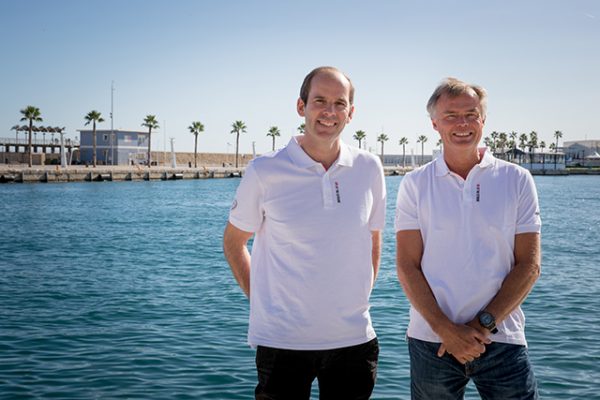Richard Brisius and Johan Salén have been appointed as president and co-president of the Volvo Ocean Race, taking over from the outgoing chief executive, Mark Turner.
There are two new men at the helm of the Volvo Ocean Race.
Race organisers have announced that Richard Brisius and Johan Salén are the new president and co-president of the series.
They take over from CEO Mark Turner who announced in September that he would be quitting the race following the decision that the 2019-20 competition would not be raced in new boats.
Brisius and Salén, who together founded Atlant Ocean Racing, have worked with seven Volvo Ocean Race campaigns over the past 28 years, starting as sailors in the 1989-90 race, before finding success with team management, including winning efforts EF Language (1997-98) and Ericsson 4 (2008-09), as well as second place finishers, Assa Abloy (2001-02), and Intrum Justitia (1993-94).
Most recently, the pair managed Team SCA, the all-female entry, in the last edition of the race.
‘It’s an honour to be involved with my friends in the Volvo Ocean Race again. The race is at the very heart of the sport of sailing and it has formed the backbone of so much of my life,’ Brisius said.
‘At the core of the Volvo Ocean Race are some of the very best athletes in the world, racing in what I think must be the most relentless competition. Their efforts and determination inspire people across the world, and creates outstanding value for partners and host cities.’
More below…
Race changes rules to attract world’s best female sailors
The Volvo Ocean Race is making a major rule change to give world-class female sailors a much clearer pathway to…
Volvo Ocean Race unveils combined Monohull-Multihull future
The Volvo Ocean Race has solved the question of whether its future should be monohull or multihull – by opting…
Brisius is currently the CEO of the company owned by the National Olympic Committee, running Sweden’s bid to host the Winter Olympics and Paralympics in 2026 and he will remain in that role.
Johan Salén has worked alongside Brisius on all of their previous Volvo Ocean Race projects. He will take a leading role in both operations and in devising a strategy for the future of the event alongside the current leadership team.
‘When we see what is happening on the water during Leg 2 from Lisbon to Cape Town, it is impossible not to be impressed by how the teams are performing and the way the race is being presented to fans and stakeholders,’ Salén said. ‘And I have no doubt the next few months of this race will continue to be fantastic for our teams, sailors, and fans.
‘Looking forward, it is clear we need to work closely with Volvo and all stakeholders, including future teams, sailors and commercial partners, to create something even greater for the future. I know that process is already underway with the existing leadership team. We all know the importance of setting a clear roadmap for the future in terms of event timing and class of boat as well as the commercial offering,’ he added.
Both Brisius and Salén will be pivotal in deciding the future direction of the competition. In May, Volvo Ocean Race announced the biggest shake up in its history.
It unveiled plans for a series of radical initiatives, including introducing a new foil-assisted ocean racing monohull and a ‘flying’ catamaran for In-Port Races. It was also decided to move the race from a three year cycle to a two year cycle.
Former CEO Mark Turner announced in September that he would be leaving his post after it was revealed that these new boats would not feature in the next edition of the race.
At the time, he said that essentially he failed to get signatures on the dotted line in time to be able to move forward with racing in new boats for 2019-20, and stressed that Volvo was still committed to the race.
‘They’re very excited about this race and have more plans, more activation, and more things going on than they’ve ever had before,’ he said.
‘So I think there’s a genuine excitement and commitment to the race going forward, but we just couldn’t move some of the processes and the steps forward in the same timeline that we needed to be able to guarantee that we’d have a great race in 2019 with boats actually finished and on the start line,’ added Turner, who joined the Volvo Ocean Race team in summer 2016.






